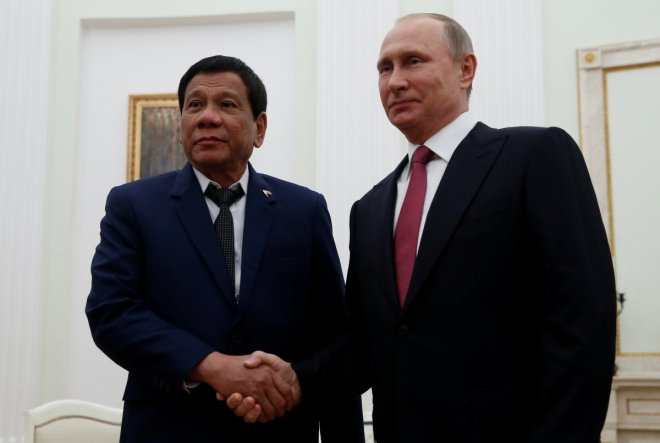
Philippine President Rodrigo Duterte declared martial law across the southern third of the country on Tuesday. This comes after the deadly clashes between security forces and Islamic State group-linked militants in a major city.
The announcement was made by his spokesman at a press conference in Moscow, where Duterte was on an official visit. It fulfills an often-repeated warning by the president that he would enforce military rule to quell security threats.
Spokesman Ernesto Abella said in the nationally televised briefing that Duterte placed the entire southern region of Mindanao, which makes up roughly one third of the country and is home to 20 million people, under martial law.
According to him, martial law would be in place for 60 days, in line with constitutional limits on the use of military rule.
In the Philippines, martial law is particularly sensitive because it was used by dictator Ferdinand Marcos to remain in power during his two-decade reign, which ended in 1986 with a "People Power" revolution.
Late on Tuesday, Duterte met with Russian President Vladimir Putin at the Kremlin, prior to his return to the Philippines, and explained his abrupt departure. "Units of the Islamic State Group are occupying a province and there are clashes, a military operation is still ongoing. Unfortunately, I must go there now," Duterte said at the start of the meeting.
The announcement of martial law came after security forces battled dozens of IS-linked gunmen in a Marawi, a city of about 200,000 people in Mindanao, on Tuesday. Marawi is about 800 kilometres south of Manila, the nation's capital.
"Our country needs modern weapons ... to fight against the Islamic State group we need weapons," Duterte said in Moscow.
Defence Secretary Delfin Lorenzana said one policeman and two soldiers were killed in the clashes, which began when security forces raided a house where they believed Isnilon Hapilon, a leader of the infamous Abu Sayyaf kidnap gang and Philippine head of IS, was hiding.
Several photos posted on social media by residents showed the gunmen walking through the streets of Marawi and placing a black flag that looked similar to those used by IS.
Lorenzana added that the gunmen, who were believed to number more than 100, had occupied a hospital and a jail. They also burnt down buildings including a Catholic Church. He said many were hiding in buildings as snipers, making it difficult for security forces to combat them.
Duterte, who is known internationally for waging a war on drugs that has claimed thousands of lives, had said on many occasions since becoming president last year that he was prepared to declare martial law nationally as well as in Mindanao.
But, Abella and Lorenzana both emphasised on Tuesday that the martial law on this occasion remained restricted to Mindanao.
The Abu Sayyaf, based on the most southern islands of Mindanao, has kidnapped hundreds of Filipinos and foreigners since the early 1990s to extract ransoms. The group has been listed as a terrorist organization by the United States.
The group has been blamed for the country's worst terrorist attacks, including the 2004 bombing of a ferry in Manila Bay that claimed more than 100 lives.









